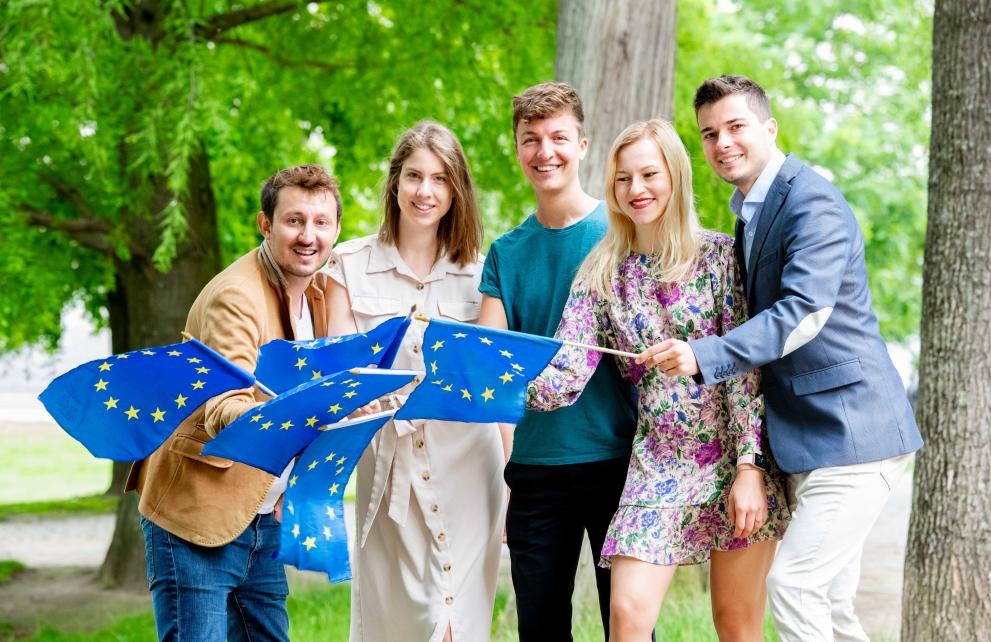
On Monday evening, the European Parliament and the Council of the European Union, on a proposal from the European Commission, have reached an informal political agreement on the EU budget for 2022, the second under the 2021-2027 EU multiannual financial framework. The agreement is for commitments of €169.5 billion, and payments of €170.6 billion. Once adopted, the budget would allow the EU to mobilise significant funds for a continued EU response to the coronavirus pandemic and its consequences; to kick-start a sustainable recovery and to protect and create jobs. It would trigger further investments into a greener, more digital and more resilient Europe, while protecting the most vulnerable in its neighbourhood and around the world.
Commenting on yesterday's political agreement, Commissioner Johannes Hahn, in charge of Budget and Administration, said: This agreement confirms that all institutions are ready to reach a compromise for the sake of a budget, which will support a sustainable recovery and the EU's necessary transition to the benefit of all. ”
The budget agreed yesterday will direct funds to where they can make the greatest difference, in line with the most crucial recovery needs of the EU Member States and the EU's partners around the world.
More concretely, it has been agreed to direct:
- €49.7 billion in commitments to support the recovery by boosting investments in economic, social and territorial cohesion;
- €53.1 billion for the Common Agricultural Policy and €971.9 million for the European Maritime, Fisheries, and Aquaculture Fund, for Europe's farmers and fishermen, but also to strengthen the resilience of the agri-food and fisheries sectors and to provide the necessary scope for crisis management;
- €12.2 billion for Horizon Europe, to support the EU's research in areas like health, digital, industry, space, climate, energy, and mobility; and €613.5 million for the Single Market Programme, supporting competitiveness and SMEs, including in the tourism sector;
- €839.7 million for the EU4Health programme to support the EU Health Union and to deliver a comprehensive response to the health needs of European citizens;
- €1.2 billion under the Just Transition Fund to make sure the transition to climate neutrality works for all and €755.5 million under the LIFE programme to support environment and climate action;
- €2.8 billion for the Connecting Europe Facility for an up-to-date, high-performance transport infrastructure to facilitate cross-border connections;
- €3.4 billion for Erasmus+ to invest in young people, as well as €406 million for the cultural and creative sectors through the Creative Europe programme;
- €1.1 billion for the Asylum, Migration and Integration Fund and €809.3 million for the Integrated Border Management Fund to step up cooperation on external border management, including €25 million for the protection of the border with Belarus, as well as migration and asylum policy, which also includes additional funding for resettlement pledges;
- €227.1 million for the Internal Security Fund and €945.7 million for the European Defence Fund to support European strategic autonomy and security;
- €15.2 billion to support our neighbours and international development and cooperation. The agreement includes targeted increases for the Neighbourhood, Development and International Cooperation Instrument (NDICI) – Global Europe (€190 million), focusing on Afghanistan and Syria, as well as for the Humanitarian Aid programme (€211 million) to address crisis situations across the globe.
The full breakdown per heading is available here:
|
EU budget 2022 (in million euro): |
|
|
|
APPROPRIATIONS BY HEADING |
Budget 2022 |
|
|
Commitments |
Payments |
|
|
1. Single Market, Innovation and Digital |
21,775.1 |
21,473.5 |
|
2. Cohesion, Resilience and Values |
56,039.0 |
62,052.8 |
|
— Economic, social and territorial cohesion |
49,708.8 |
56,350.9 |
|
— Resilience and Values |
6,330.2 |
5,701.8 |
|
3. Natural Resources and Environment |
56,235.4 |
56,601.8 |
|
Market related expenditure and direct payments |
40,368.9 |
40,393.0 |
|
4. Migration and Border management |
3,091.2 |
3,078.3 |
|
5. Security and Defence |
1,785.3 |
1,237.9 |
|
6. Neighbourhood and the World |
17,170.4 |
12,916.1 |
|
7. European Public Administration |
10,620.1 |
10,620.2 |
|
Thematic special instruments |
2,799.2 |
2,622.8 |
|
Total appropriations |
169,515.8 |
170,603.3 |
Source: European Commission: Figures expressed in €million, in current prices
Together with the budget for 2022, the EU institutions agreed to endorse the proposed amendments to the 2021 budget as tabled by the Commission earlier this year in Draft Amendment Budgets 5 and 6. Once the approval process has been finalised, the Commission will be able to increase the humanitarian aid for Syrian refugees in Turkey, and to help speed up global vaccinations by providing an additional 200 million doses for low income countries.
In parallel to the annual budget for 2022, EU countries will continue to rely on support from the NextGenerationEU recovery instrument and the Recovery and Resilience Facility at its heart.
The Commission has now adopted positive assessments of 22 Member States' recovery and resilience plans. The Council has subsequently approved each of these assessments. The Commission has so far disbursed €52.3 billion in pre-financing payments to seventeen Member States.
What happens next?
The annual budget for 2022 will now be formally adopted by the Council of the European Union and by the European Parliament. The vote in plenary, which will mark the end of the process, is currently scheduled for 24 November 2021.
For More Information
Details
- Publication date
- 16 November 2021
- Author
- Representation in Cyprus
